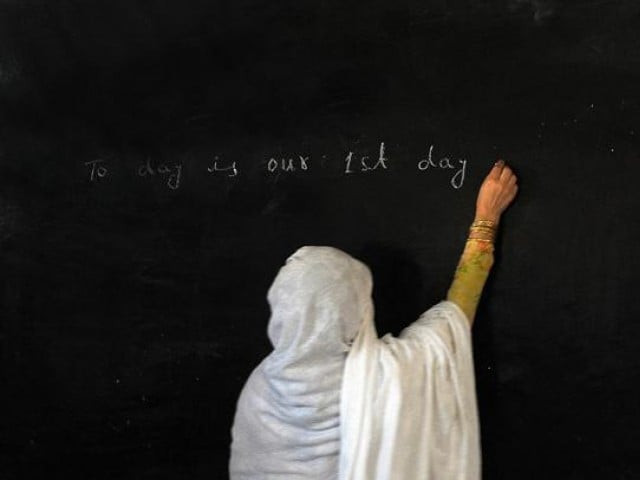Losing my religion: No ethics teachers for non-Muslims in Khyber-Pakhtunkhwa
Educationists say current textbook has nothing about religion.

Paul underlines the law states every citizen had an equal right to gain knowledge of their own religion. PHOTO: AFP
While there are Islamiat teachers aplenty, the Khyber-Pakhtunkhwa government has yet to appoint a single ethics teacher for non-Muslim students in the province. The existing civics handbook for the students mentions nothing about their religion.
Pakistan Minorities Teachers’ Association Professor Anjum James Paul says the K-P government has been repeatedly requested over the last ten years to provide equal rights to minority students as enshrined in articles 20-A, 22-I and 25-I of the Constitution of Pakistan.
Paul underlines the law states every citizen had an equal right to gain knowledge of their own religion. He accuses the K-P education department of not taking this matter seriously, adding non-Muslim students are taught using Islamiat books.
Left behind
Paul says the education department has yet to appoint a single teacher for non-Muslims across the province. Paul says the civics coursebooks given to minority students are still being brought in from Punjab.
He explains the syllabus only preaches ethics and nothing about religion to non-Muslim students. The professor says there are schoolchildren who come from various religious backgrounds and the K-P government must provide a syllabus according to their needs.
“If only the two percent job quota for non-Muslims is implemented, the problem of teachers for minority students will be solved to a great extent,” he stresses.
He demands the provincial government publish separate books for each minority on the basis of religion and appoint teachers for the relevant coursework in government schools.
Politics and religion
A K-P Textbook Board official, requesting anonymity, agrees no steps have been taken for the religious education of minorities, while ethics books are ‘imported’ from Punjab. The official claims there aren’t enough resources to create separate books for students of different religions.
A Dabgari Garden Government High School teacher says there are five non-Muslim students enrolled at his school, but have to take Islamic Studies due to the lack of literature. He adds there is no ethics teacher and students have no choice but to take Islamic Studies.
Unhappy with changes
Earlier, ruling coalition partner Jamaat-e-Islami (JI) had reservations over certain content in several textbooks. The government made amendments, adding and subtracting material and chapters.
All Primary Teachers Association President Malak Khalid Khan says his peers are unhappy with the changes in curriculum.
He says primary level books used to be according to a set syllabus and coursework could easily be completed before examinations. Khan points out new chapters have been included at even the primary level and this is proving to be an added burden on not only the teachers, but also students.
About minority teachers, he also says there is not a single one at a government school, even though several schools have non-Muslim students.
‘No issues’
Directorate of Curricula and Teacher Education (DCTE) Director Bashir Hussain Shah says ethics books are brought in from Punjab to meet the demands of schools. He adds there are no issues as every teacher in the school can teach the syllabus. The DCTE director adds permission has also been given to vendors to sell the ethics book at their shops and it is easily available in the market.
He says they cannot design separate books for each religion, adding the ethics book has been introduced after consultation with religious groups. About changes to the curriculum, he claims they are extremely minor and new books have been provided to every school. Shah says the shortage of books has also been resolved.
Published in The Express Tribune, May 20th, 2015.













COMMENTS
Comments are moderated and generally will be posted if they are on-topic and not abusive.
For more information, please see our Comments FAQ